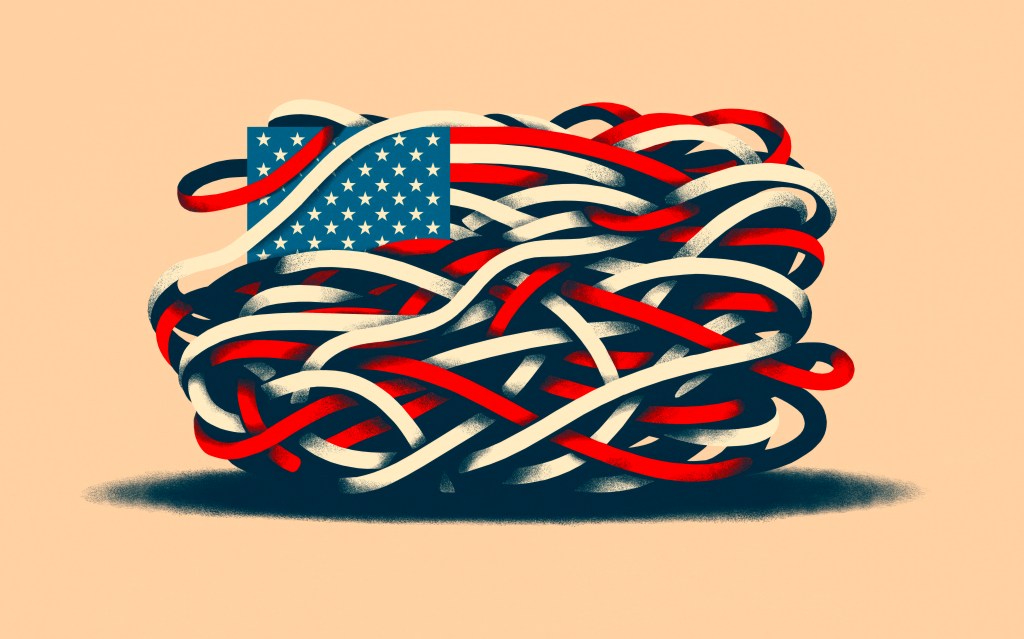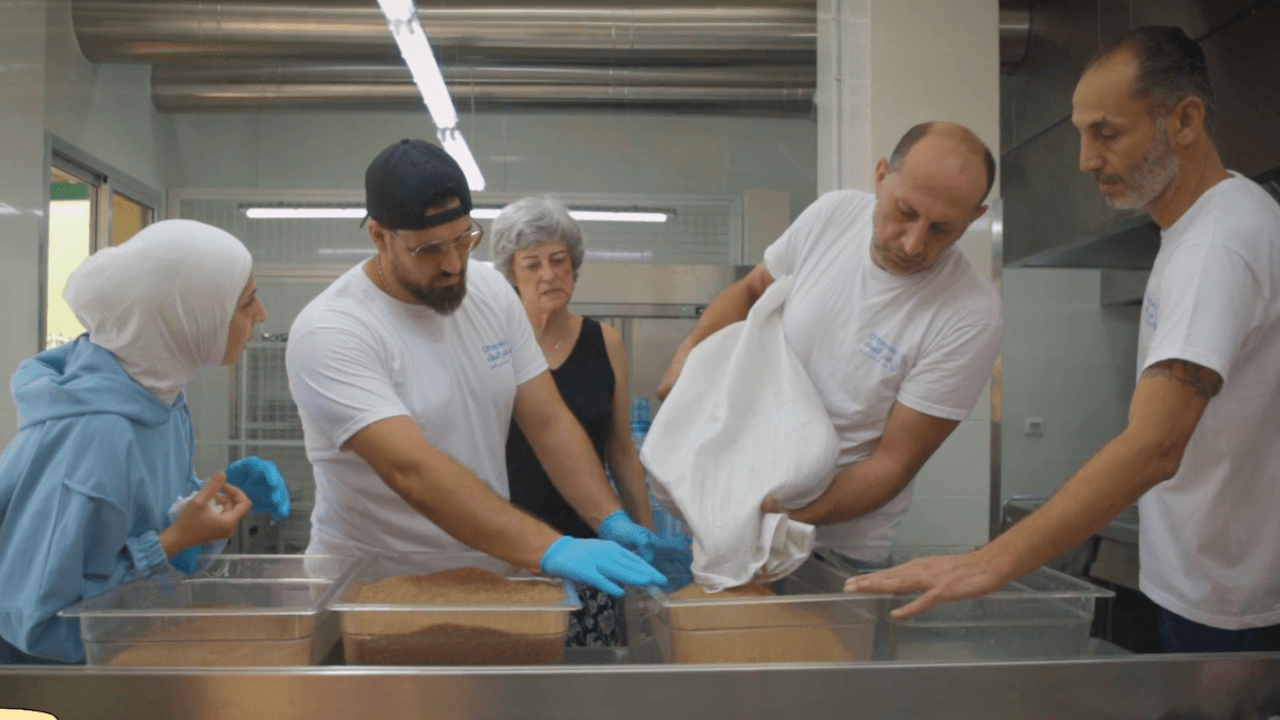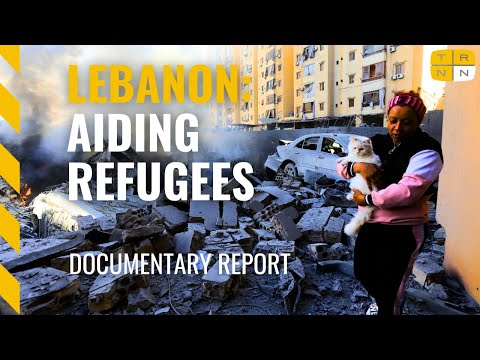Israel’s war on Lebanon has triggered a massive wave of refugees converging on Beirut. While the task of supporting the 1.2 million internally displaced people would normally fall to the government, Lebanon has been without a president since 2022. Organizations like the Beit Aam Community Space and the One Roof Initiative have risen to fill the vacuum, coordinating Lebanese civil society to provide shelter and meals to those who desperately need them. The Real News reports from Beirut on the state of the war and the mutual aid helping keep Lebanon’s refugees alive.
Videography: Kamal Kanso, Hadi Hoteit (Lebanese journalist)
Fixer: Bachir Abou Zeid (Filmmaker)
Producers: Leo Erhardt, Belal Awad
Video editor: Leo Erhardt
Transcript
Soha Mneimneh – Urban Planner and Member of ‘One Roof’ Initiative: This is central Beirut, which has not rested a single day; not just in recent years, but historically. At the time of the October 17 protests, tear gas was thrown at us on this square. At the time of the explosion of the port, it was this square that was affected. Today, this square is sheltering refugees who should be being sheltered by the government in appropriate shelters. In the first few days people were sleeping on the streets, they didn’t know where to go. There was an atmosphere of hysteria. There were women who gave birth on the street.
Narrator: Since October 2023, in response to Israel’s actions in Gaza, the Lebanese resistance group Hezbollah has been attacking Israel from south Lebanon. They have repeatedly said that they will continue to fight until a ceasefire is implemented in Gaza.
In September 2024, Almost 1 year into what’s been described as one of the bloodiest wars of the 21st century, Israel set its sights on Lebanon. Starting with a mass terror attack that indiscriminately caused thousands of pagers and walkie talkies to explode. Followed by a huge bombing campaign that stretched from north Lebanon all the way to the capital, Beirut.
In one strike, Israel dropped over 80 tons of explosives over the densely populated, residential suburb of al Dahiyeh, penetrating more than 60 ft below ground and killing Hezbollah leader Sayed Hasssan Nasrallah, alongside at least 33 others.
Since then, strikes have become a daily reality in Beirut.
Though the Israeli army and some media outlets regularly label the areas targeted by Israel as “Hezbollah strongholds” they are in fact targeting densely populated, residential and civilian areas terrorizing huge sections of Lebanese society and causing unprecedented levels of displacement.
Since September, an estimated 1.2 million people – around one Fifth of the entire population of Lebanon – have been displaced. Many have come to Beirut.
Soha Mneimneh is a Lebanese urban planner and member of “Sakf Wahed”, or ‘One Roof’.
Soha Mneimneh – Urban Planner and Member of ‘One Roof’ Initiative: Now, I’m not just living in Beirut; my whole life I’ve never lived anywhere but Beirut. I’m a daughter of Beirut, born and raised here, and I decided that I would spend all my life here. But this is the first time I understood what it means to be displaced. I come every day to Beirut to help as much as I can. Because I’m a daughter of this city, and lived all my life here. But to be honest, unfortunately, I have also been displaced. With the Israeli aggression, and the Gaza scenario we are anticipating what could happen to us. [Gaza] is a real-life example that we see. There’s no place that’s truly safe.
Beirut has been bombed for the first time since 1982 — central Beirut. We expected to go through a crisis with the war, a refugee crisis. So we decided to organize a solidarity initiative – people to people – for people to offer their homes for free to people whose homes are in dangerous areas or under shelling. And there are so many initiatives, there are people providing blankets, people providing groceries, there are people who are cooking and serving food to those who need it.
Haidar Darwish – Coordinator, ‘BEIT AAM’ community space: Our communal kitchen is being used by “Al Balad” kitchen, they’re cooking and distributing meals for those in need. Beit Aam is originally a community center, people come to chill, they finish their work. When the war started, we were thinking: how can we help? Here there used to be a stage, if you want to take a look? Every Tuesday evening at 6pm we used to do a movie screening with the Cinema Club. Now of course, unfortunately, we’ve stopped. So the day that the pager attack took place, we thought OK we have now entered a new phase, we have to be ready.
Many people in the neighborhood have come to help us. Or there are people who are hosting refugees, who come and say “we have a family or two, we need some bedding”. They’re helping as much as they can.
Soha Mneimneh – Urban Planner and Member of ‘One Roof’ Initiative: There’s something really strange that is happening that the people volunteering to help, are themselves refugees. Because of this we continue to be in solidarity with each other because we have an understanding that everyone is suffering to different degrees.
Narrator: Fatima Ni’ma, is one of those displaced from the South, who is volunteering to help others like her. She is working in a kitchen run by community initiative Farah Al Ataa, or the “Joy of Giving” which is providing meals and emergency shelter to thousands.
Fatima Ni’ma – Kitchen volunteer at ‘Offre Joie’: In the south, we’re living close to the border areas, we would hear strikes and explosions. That’s why, you know, we southerners, don’t leave our lands easily. So we said we’ll wait, we’ll be patient but when the strikes started getting close to us and they started targeting homes, killing civilians, so we were forced to leave. We were forced to go to family in Dahieh because we didn’t have a chance to find a place. There wasn’t any time. That same day, we had to leave again from Dahieh because they threatened Dahieh and as soon as we left the strikes started. We were forced to come here to the organization in Ashrafieh.
We stayed the first night, then we saw that they are making food for the schools and for refugees. So we said why not help? I have two kids and I know at school there are many kids who need food. It’s humanitarian help and we’re also relieving stress from ourselves, sowe started to make food with them and frankly, we are so happy, because we are making food to help refugees.
Narrator: Ali Ismail had to shut down his two restaurants in South Lebanon to flee Israeli air strikes , when he arrived in Beirut he immediately volunteered to cook for others like himself.
Ali Ismail – Chef volunteer at ‘Offre Joie’: Frankly when the strikes first started, savage strikes, from everywhere I don’t know how we were able to get our things, get in the car and escape. The strikes were everywhere, on people, on civilians, even when we were driving, on the roads the strikes were next to us. There were even civilian cars that were hit while moving. We were on the road for about 18 -19 hours, before we got to safe areas. Frankly people have welcomed us with love, there is warmth with us.
Narrator: Ahmed Awali is another displaced person, he has been living in “Sky Bar” a Beirut nightclub that has opened its doors to refugees since the crisis.
Ahmad Awali – Retired military and taxi driver: I mean, they were moments of terror. We were drinking tea, when suddenly there were these heavy strikes. I mean, there was no chance. We could barely get up and get in the car and get out of the area. That’s what happened. The first day we went to the Zaituna Bay area. We slept two nights in Zaituna Bay – on the streets I mean. We’ve lived displacement before, but this is different to those situations. Maybe they think that they can break our will but with the grace of God we are a mighty people who will endure. We have no choice. The sweet and the bitter we will endure.
Vox Pop Woman 1: When they exploded the pagers, we were expecting to be at war in a day or two. Certainly, we Lebanese are united but who’s suffering? It’s the poor. We the poor are suffering. Everyone’s been displaced from their homes.
Vox Pop Woman 2: It’s no different for us than in Gaza. They are hitting homes, children are being killed. You know the situation is hard, people don’t have money, how do you eat? How do you drink?People slept on the streets, for example.
Vox Pop Woman 1: I mean, the day before yesterday I went to see my friend who’s displaced in the school. The suffering is beyond description. How she was living at home, and how she is living now – it’s so sad. She can’t afford to rent, she can’t afford to rent anything at all.
Vox Pop Woman 2: [Israel] is oppressing innocent people, and is targeting people who are not involved.
Soha Mneimneh – Urban Planner and Member of ‘One Roof’ Initiative: Today it’s no longer a question of “who is responsible for the war”. It’s a question of: there is a war criminal, who is carrying out war crimes, in multiple countries, who has to be stopped. It’s not a question of specific organizations: It’s very clear that Israel has carried out multiple war crimes. This is the basis that we have to speak about today. There has to be international accountability for all who are carrying out these crimes.
Haidar Darwish – Coordinator, ‘BEIT AAM’ community space: Our position is clear: there are people bombing us, there are people killing us, we’re going to oppose them. There are people killing innocents in Palestine, and across the Middle East, of course we will oppose them. We are standing with our people, with our families. We hope that the work we do explains our position clearly.
We hope for the future just two things, we hope to live in peace, that there’s a ceasefire in Palestine, in Lebanon—across the Middle East—and that the occupation ends, because we deserve to live in peace.






